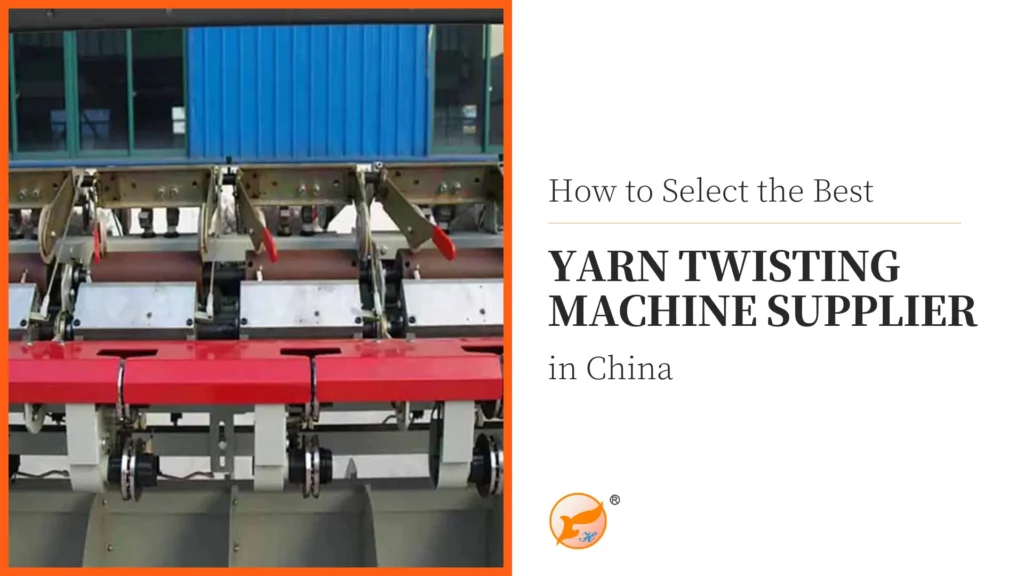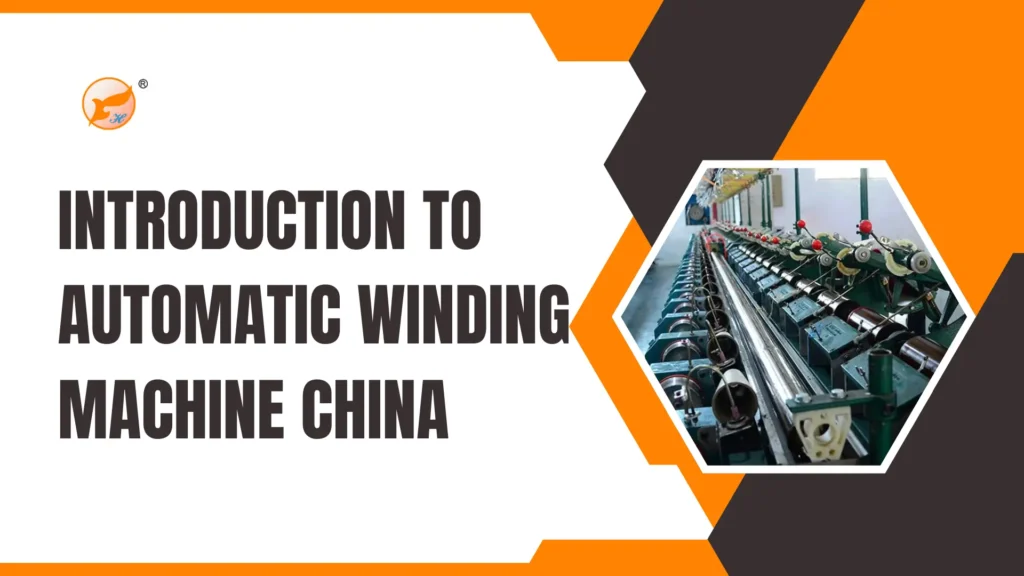The strands of yarn are brought together into one strand which could draw strength from and durability to it.
The twisting action is carried out through several mechanisms, including twisting spindles or are jets, depending on the machine type.
Twisting yarns is a very important aspect in yarns as it is one of the important processes that turn yarn into fabric.
These variations are very important for clothing, upholstery, and other industrial fabrics.
So, knowing the significance of yarn twisting could help industries develop products according to market requirements.
There are a number of different types of yarn twisting machines available, each one specially designed for certain purposes and types of yarn.
They are friction twisting machines, which can be used to produce unique twisting options that create specialized yarn characteristics.
Knowing these types will surely help one choose the right machine according to production needs.
Market for Yarn Twisting Machines in China
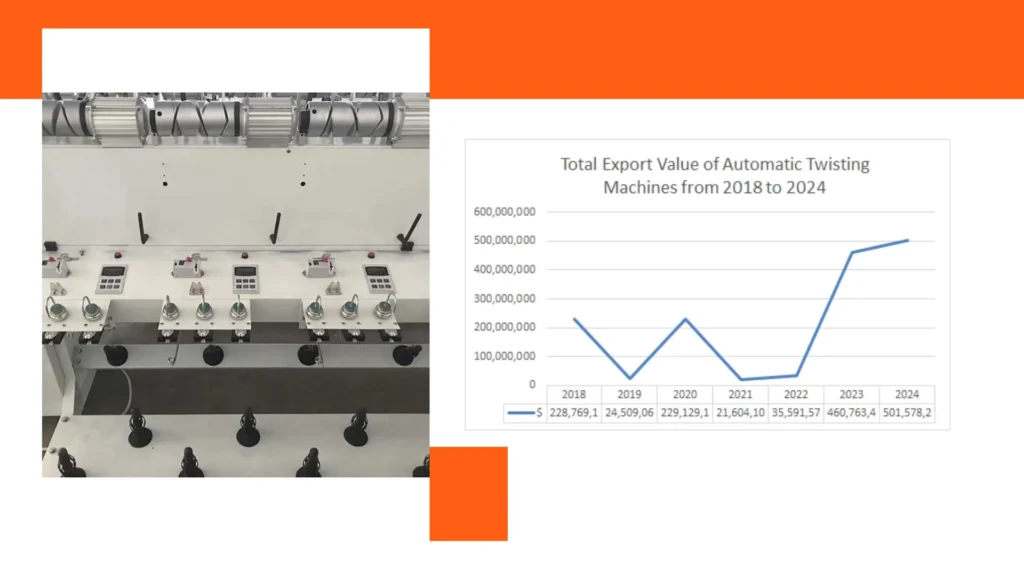
China’s Textile Industry Overview
With the world’s largest textile production capability, it contributes to a greater part of the export market.
The highly developed and superior technology, skilled and trained labor, vast network of suppliers and manufacturers altogether form China’s extremely dynamic environment that offers very valuable opportunities to buyers looking for quality yarn twisting machine.
Lastly, involvement into this market landscape will equip you with necessary tools for maneuvering your purchase decisions.
And More:
Industry-Specific Applications of Yarn Twisting Machines
Market Competitors
Several top suppliers of yarn twisting machines in the market comprise major players in competitive development.
In most instances, large manufacturers tend to be those who have made a name for themselves on the quality and innovation fronts, thus representing a trustworthy choice of partners for business purposes.
Studying these companies, therefore, can reveal whether they have the best products, technological advancements, and customer service for supplier shortlisting as per business needs.
Trends in Yarn Twisting Technology
The textile industry, as an ever-evolving industry, does not fall short of new technological advancements in increasing the efficiency of production processes and making improvements in the quality of the finished products.
New trends in yarn twisting machines focus automation, energy efficiency and smart technology for monitoring of production processes.
Keeping track of progress in these developments helps businesses stay competitive and improve their manufacturing capabilities.
By selecting suppliers that invest in the latest technology, you’ll ensure that your equipment will be modernized.
Factors to Consider When Choosing a Supplier
Quality of Machinery
The quality of the yarn twisting machines can prove a cardinal factor in ensuring the productivity and efficiency of the manufacturing processes.
The right machines can sometimes cut down on downtime, maintenance costs, and yield a better quality product.
While assessing suppliers, one should greatly focus on the commitment of the suppliers to quality assurance and adherence to international standards.
A genuine supplier will not hesitate to give an open account on the quality control process adopted and prove the quality of its machines.
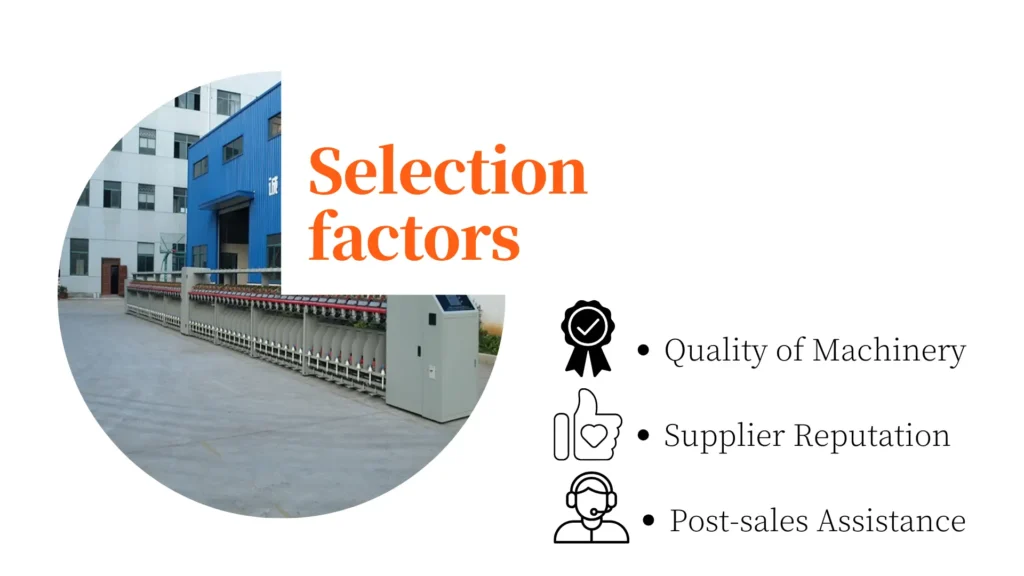
Supplier Reputation
The reputation of a supplier is an essential consideration that determines the reliability and trustworthiness of the supplier. Research into customer reviews, testimonials, and case studies are some of the ways a business can learn about the experiences of other companies with a particular supplier.
A supplier with a very strong market presence and positive feedback is likely to deliver on its promises and sustain the quality of service.
Establishing a relationship with any reputed supplier will accrue long-term benefits, including better negotiation and support.
Post-sales Assistance
After-sales support is all about keeping your yarn twisting void machines in good working order.
An ideal supplier would provide you with comprehensive support that includes installations, training, and post-sale service.
This kind of support helps in minimizing hindrances in your production processes and ensures your machines operate effectively over the years.
Before making the final commitment, ask about the level of after-sale support they offer; it must link with your business needs.
Evaluating Supplier Certifications
Importance of Certifications
Certifications have been recognized as great pointers to the supplier’s commitment to quality and safety in any product or service area.
They indicate that respective machinery meets specific standards and requirements in the industry.
Seek for ISO (International Organization for Standardization), CE (Conformité Européenne), and so forth, while short-listing suppliers-it stands for the international level, for quality, as well as safety compliance.
Also Read:
Role of Yarn Twisting Machines in Sustainable Textile Manufacturing
Adherence to International Standards
The international standardization of supplier products is very essential, especially in the case when selling in global markets.
Aside from assuring the quality of machinery, compliance also assures customers of the safety and dependability of your product.
Suppliers likely adhere to these requirements and are the most reliable partners one would wish to have.
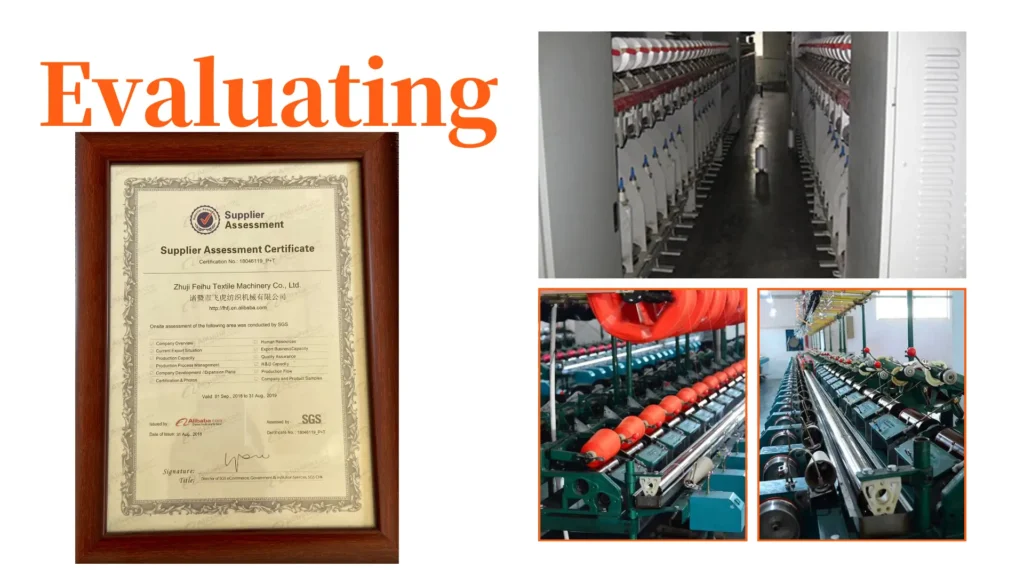
Environmental Compliance
Today, since sustainability becomes much more valued, suppliers must also practice going green.
Search for the ones whose certifications are ISO 14001 that relate to environmental management.
Such certifications would indicate that a supplier is active in reducing environmental impact, which could be beneficial for your business’s vision towards sustainability and its appeal to eco-conscious consumers.
Cost Considerations
Pricing Structures
Knowing the pricing structures of different suppliers makes it more likely to make informed decisions in line with what one’s budget allows.
Machine costs can be compared from various suppliers but, here, it’s worth noting that the least expensive supplier may not always offer the best value in return.
Then weigh other factors, such as quality features and after-sales support- against pricing.
Hidden Costs
Some costs can be hidden and occur during the process of purchasing.
It includes shipping fees, installation fees, and maintenance fee for the period afterward.
Clarifying those aspects with suppliers before buying would avoid such surprise expenses but would allow the customers a full grasp of the total investment required.
Payment Terms
It is also crucial to go through the payment terms that suppliers are willing to offer before one manages the cash resources.
Flexible payment terms, for instance, by either installments or deferments, would help ease financial stress and improve budgeting.
Most likely, favorable payment terms would also promote a warmer atmosphere in supplier relations.
Communication and Language Barriers
Necessity of Clear Communication
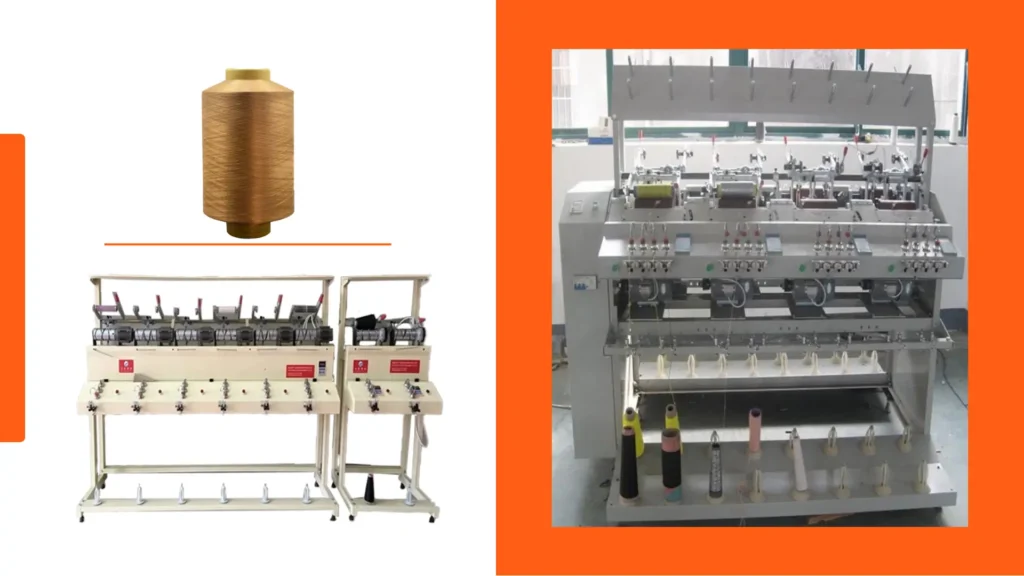
Efficient communication is mileage between the parties to the business.
Expectations or requirements of complications meet clear understanding; likewise, miscommunication causes a cost cut error.
So one should choose a supplier who can openly and effectively communicate in the language understood by all.
Overcoming Language Barriers
When there is an obstacle related to language differences, you might have to use a translation service and look for suppliers who have English-speaking representatives.
Clear communication is very essential when negotiating contracts, talking about technical specifications and in avoiding all unnecessary complications that might develop during the procurement process.
Fortunately, clear communication is going to make your working relationship much smoother.
Responsiveness
A responsive supplier takes care of all your issues and guarantees a smooth deal.
Test the supplier’s responsiveness to your initial discussions such as how prompt they are to replies to your inquiries and how thorough they would be in addressing your questions.
The probability of having a supplier who offers better service along your partnership increases if that supplier rated high on communication.
Visiting the Supplier’s Facility
Importance of Visits to the Factory
a visitor at the vendor venue is simply regarded an opportunity to study the processes in which he or she is involved with and observe the quality of machinery.
It gives you the benefit of seeing the production process firsthand, assessing working conditions, and evaluating the level of technology; it lets one make even a more informed decision and gives the necessary amount of trust in a supplier.
What You Need to Look For While Visiting
As you go around the factory, keep your ears open again toward many aspects of the factory surrounding.
Check out cleanliness, organization, and whether they follow safety rules.
Well-maintained place shows so much when it comes to a vendor’s commitment to having produced quality.
Also observe from the actual operation if the machines perform efficiently and at a recommended level.

Meeting the Team
Meeting the team behind the machines can give an insight into their expertise and relation to customer services.
Talk to engineers and technicians to get a better awareness of their manufacturer’s attitude towards customer support.
Building rapport with the team can enhance communication and thus create strong partnership bonding.
Long-Term Relationship Potential
Building a Partnership
The supplier in question must be interested in building a long-term relationship rather than being involved in a single transaction.
This type of supplier would then offer ongoing support coupled with better prices and tailored solutions to meet the changing business environment needs of your organization.
Look at some indications of willingness to engage and adjust to your requirements.
Future Needs
Consider your future needs now and how the supplier might be able to grow with you.
An insightful supplier will understand very well the long-term objectives and will be able to preempt solutions that fall in line with your vision.
That is where the partnership becomes most rewarding and sustainable over the longer term.
Communication
An important element in maintaining a healthy business relationship with your supplier is regular communication.
It allows addressing issues whenever they arise, planning for further collaboration projects, and ensuring both parties work towards the same goal.
More regular contact can improve eventual collaboration and strengthen the partnership.
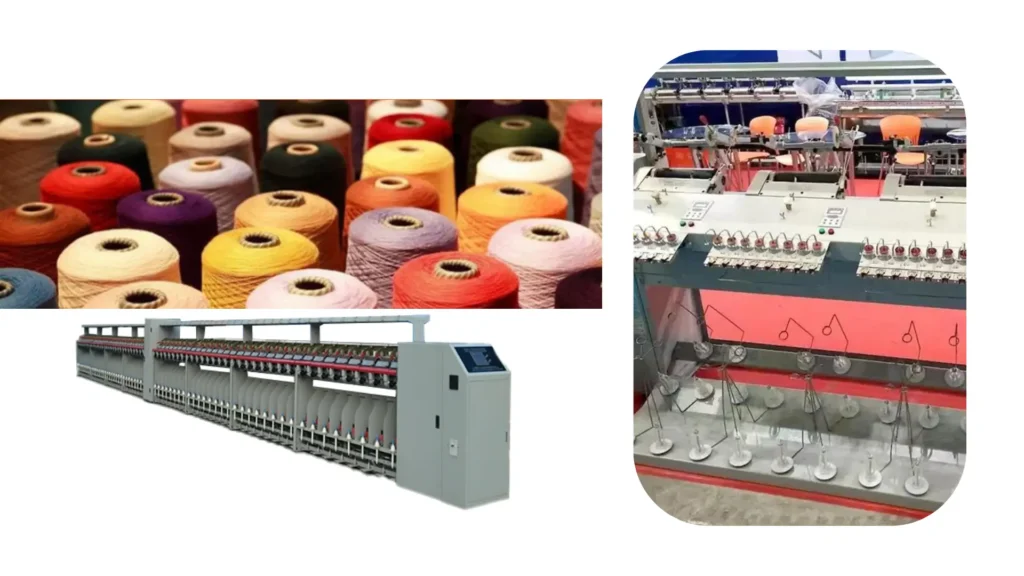
Conclusion
Choosing the ideal yarn twisting machine supplier is very important for the success of your textile business.
With the key aspects provided in this guide, you can make a choice that serves your desires and creates the best conditions for the production process.
An appropriate selection process will yield better quality products at an improved operational efficiency.
You need to put time into researching and judging possible suppliers.
The textile manufacturing machinery market is a large one, and hence, a well-informed decision will substantially affect the growth and innumerable future implications for your business.
Take your time on the decision for it will pay off in many years down the road.
A proactive approach will get you going well into the successful future of textile production and will build your competitive advantage in the market.
